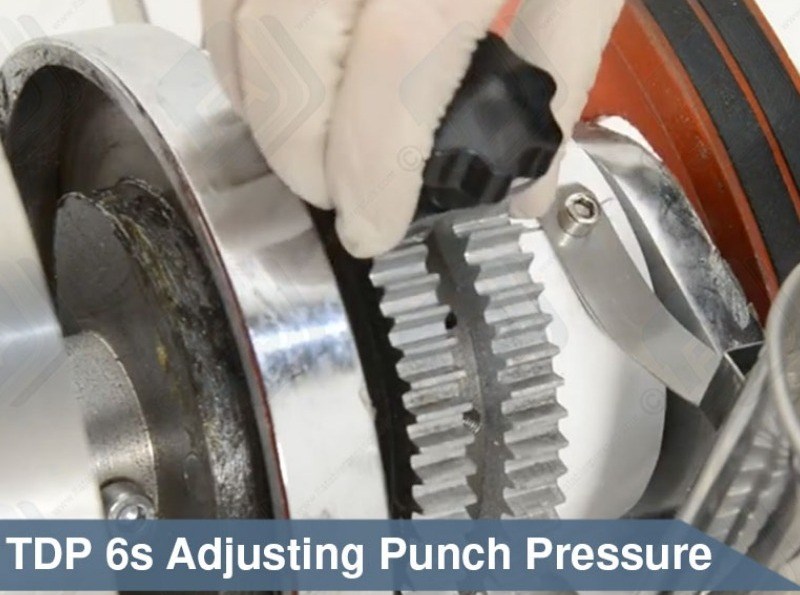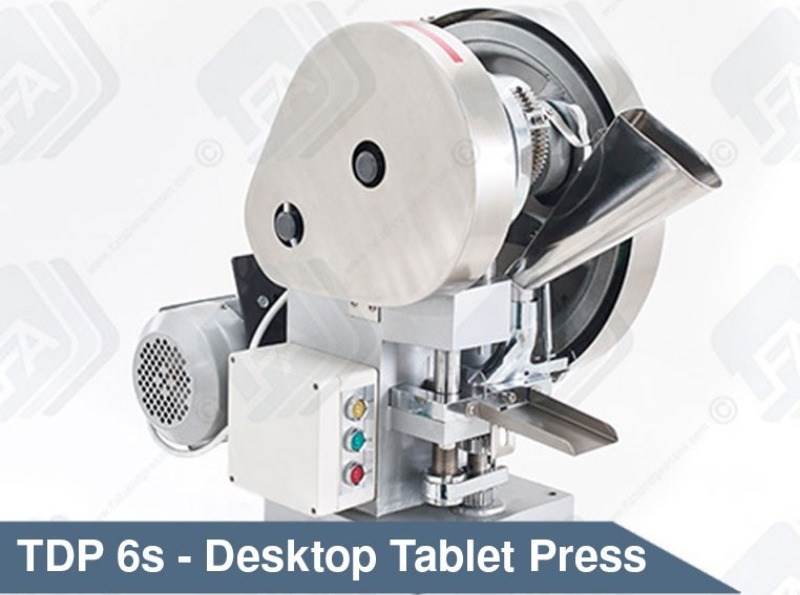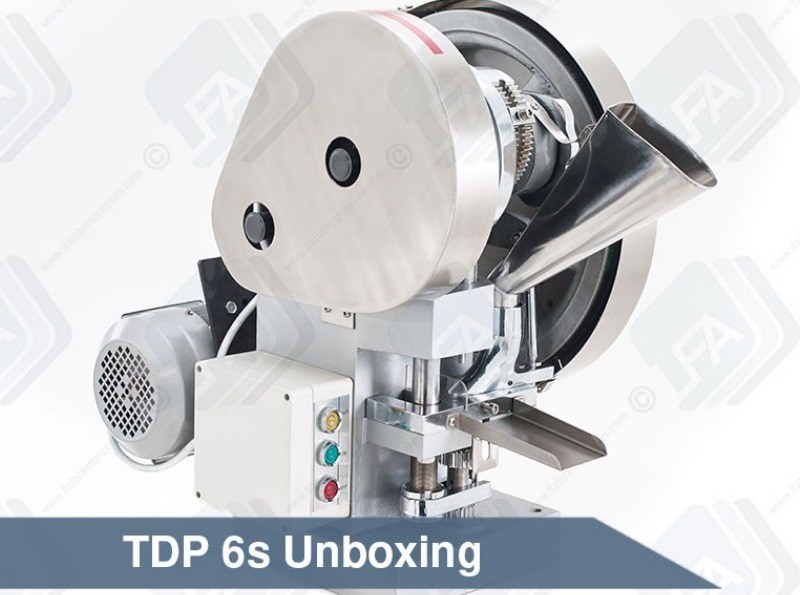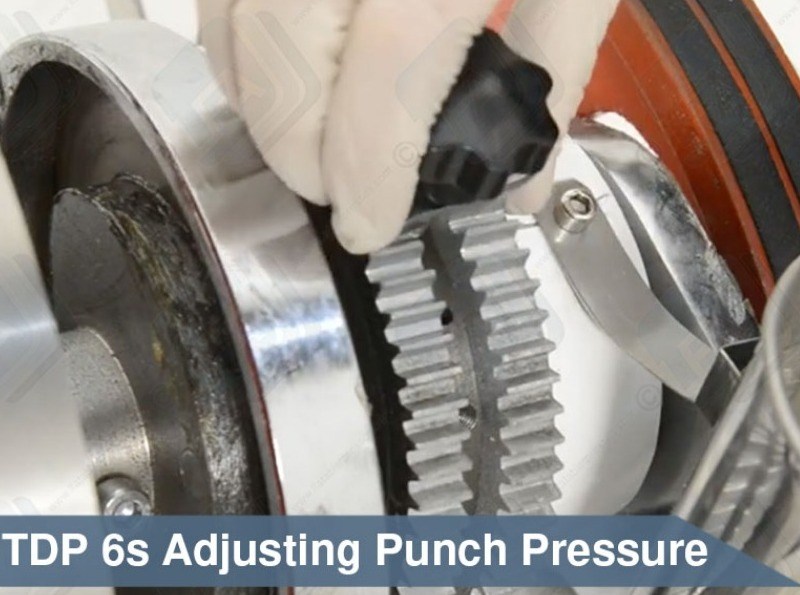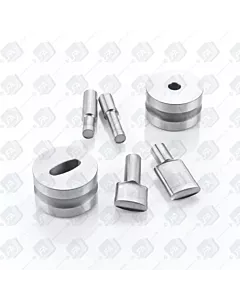TDP 6s Desktop Tablet Press
Manufactured by LFA in Taiwan, the TDP 6s v2 is a single punch desktop format tablet press that is based on the highly popular TDP 5, but featuring an upgraded drive mechanism, a more powerful motor, and greater maximum pressure. The TDP 6s can also produce the largest tablets of the TDP range, with a maximum diameter of 25 mm.
Connect with Our Team
If you have a question or would like more details on the TDP 6s Desktop Tablet Press, please complete the form below and someone from our team will be in touch with you soon.

The TDP 6s v2 has been upgraded from the original model with new bearings and long-lasting parts. It is still however fast and flexible and can run on either electricity or manual power. If you are looking for a tablet press to help you develop new tablets or to test concepts prior to rolling them out for production, the TDP 6s v2’s ability to produce a wide range of tablet sizes in small quantities means that this is definitely the machine for you. Designed to suit the needs of the laboratory and developmental work rather than large scale manufacturing, the TDP 6s v2 is nevertheless capable of producing any quantity from just a few tablets all the way up to small production runs of up to 3,000 tablets an hour.
The appeal of this tablet press lies in its versatility, combined with a strong feature set and the high quality of its manufacture. The latter ensures excellent reliability. For all these reasons the TDP 6s v2 is a popular choice for use in research institutes, laboratories, food technology applications, pharmaceutical development, chemical plants, hospitals, or any location where flexibility, ease of use, and speed are at a premium.
Main Benefits of the TDP 6s v2 Tablet Press
- Highest Pressure in Category - The TDP 6s v2 like its predecessor has the highest total compression force in its range. This extremely high pressure makes it better suited for products that are more difficult to press like herbal supplements and products that are not directly compressible
- Affordability - Click on the “profit calculator” tab above and see for yourself how fast this pill press will pay for itself. This is a profit-generating machine and few investments exist that pay for themselves this quickly.
- Training - We offer free training at an LFA facility with every purchase. However, many customers prefer to use our video tutorial database.
- Great For Developing New Products - The TDP 6s v2 works with just 200 g of raw materials. If you’re on a budget, this means you won’t have to waste expensive active ingredients before you know your tabletting mix will press properly.
- Press Tablets Of Any Shape - To help you stand out from the competition, you can choose a shape and size that feels right for your brand.
- Easy To Change Tooling - If you’re creating multiple products, tooling can be changed easily and quickly to keep downtime low. See a video tutorial here.
- 3,000 Tablets Per Hour- The TDP 6s v2 is designed for small batch runs and R&D, but if your business grows fast, the TDP 6s v2 will be able to keep up with the demand while you look into more highly productive rotary tablet presses.
- Choose Your Tablet Weight and Size - The TDP 6s v2’s fill depth is 18 mm, allowing plenty of room for an effective dose of your active ingredient. This tutorial video explains setting up and controlling your tablet weight.
- Tutorials - The TDP range requires slightly more from the operator than the RTP range. That’s why we’ve created over 75+ tutorial videos on every aspect of creating your tablets on the TDP 6s v2, as well as tackling the most common problems. Find them here.
Improvements From The Old TDP 6s
- Longer Lasting - The TDP 6s v2 is manufactured by Computer Numerical Control technology meaning there is no manual process in manufacturing. Every part has been built to high tolerances.
- Easy-to-see Powder Flowability - The boot and hopper are made out of clear food-grade plastic which is dishwashable, and so you can see how well the powder is flowing.
- Produces Thicker Tablets - The fill depth has increased by 50% to 18 mm, meaning you’ll be able to produce thicker tablets with more active ingredients.
- Longer Lasting Paintwork - The paintwork has been upgraded to 3 layers of hard enamel. It is longer lasting and less likely to chip than the previous version of the TDP 6s.
- Rust Resistant - All parts are coated with rust-resistant materials so your TDP 6s v2 lasts longer.
- The motor is quieter, vibrates less, is more efficient - The motor is much higher quality.
- More Power - The belt converts more torque to the upper cam, and is therefore more efficient and will last much longer.
- Much Easier To Transport - The shipping box fits pump trucks to make transportation much easier and safer.
How Much Training Do I Need To Operate The TDP 6s v2?
For the benefit of those who have never pressed a tablet before on a TDP 6s v2, we have created a video tutorial on everything you will need to know to produce tablets on your TDP 6s v2. You can find our training videos here.
With the help of our tutorial videos, and training either over Skype or at our facility, you will be able to operate the TDP 6s v2 with ease. It is a relatively simple tablet press, and around 80% of our customers had never used a tablet press before making their purchase.
Technical Specifications
The TDP 6s v2 tablet press has measurements of 890mm x 500 mm x 880 mm, and weighs 150 kg (330.7lbs). This machine can run on mains power that supplies either 110v or 220v depending on the specifications of the country of use.
TDP 6s v2 Tablet Press in Use
The TDP 6s is an exceptionally powerful tablet press that produces dense, durable tablets from almost any dry, granular material. Thanks to its solid build and rugged design it is a very reliable machine that has earned a place in numerous laboratories and research institutes, where it is prized for its flexibility. There are few if any other machines that can so perfectly meet the needs of these types of user, being small, easy to relocate, fast, extremely flexible in its output and input requirements, and reliable.
A key element of its flexibility is the TDP 6s’ manual option. After filling the hopper, you can crank out a single tablet, or a handful of tablets, just by turning the handwheel. With an ability to run on just 200 g of raw material, this makes it easy to feel your way through the early stages of creating and refining a formula, without having to mix (and potentially waste) large batches of material. Then, when you need to produce larger numbers of tablets, you can run the TDP 6s on electricity and watch it churn out tablets by the thousand.
Adjusting the fill depth and tablet density, and changing the die on the TDP 6s can all be achieved in just a couple of minutes by loosening and tightening a few nuts or bolts.
It is a very easy machine to maintain, too, with just basic lubrication and a twice monthly inspection to keep it running smoothly. The resilient design of the TDP 6s ensures that operating problems are rare.
Research And Development
When developing tablets, you are often going to need to create different batches of tablets with slightly different formulations to find the most optimal. How well you can develop your product using focus groups and other testing methods is ultimately going to determine your product’s success.
The TDP 6s v2 tablet press is exceptionally efficient in this practice because it only requires 200 g of raw materials, allowing you to produce just a few tablets for initial testing. Once the promising formulations have been identified, you can run the TDP 6s v2 at 3000 tablets per hour for larger batches.
The TDP 6s v2 makes it easy to quickly change tooling. See how easy it is to do here.
Shipping
Our TDP 6s v2 is in stock at all times in our UK, US, and Taiwan offices, and we dispatch from the office nearest to you so that your machine arrives as quickly and safely as possible. For more details, see our shipping page.
Is The TDP 6s v2 The Right Tablet Press For Me?
The TDP 6s v2 is for the small business or entrepreneur looking for a flexible tablet press to develop and produce tablets. The TDP 6s v2 is popular because of the large maximum tablet diameter and respectable output, making it hard to go wrong with the TDP 6s v2.
A more powerful version of the hugely popular TDP 5, it is not surprising that the TDP 6s is an accomplished tablet press that works well and is easy to run. Offering more pressure than its smaller stablemate, and being able to press larger tablets, the TDP 6s expands the application of the TDP 5’s successful formula and increases the range of tablets you can press.
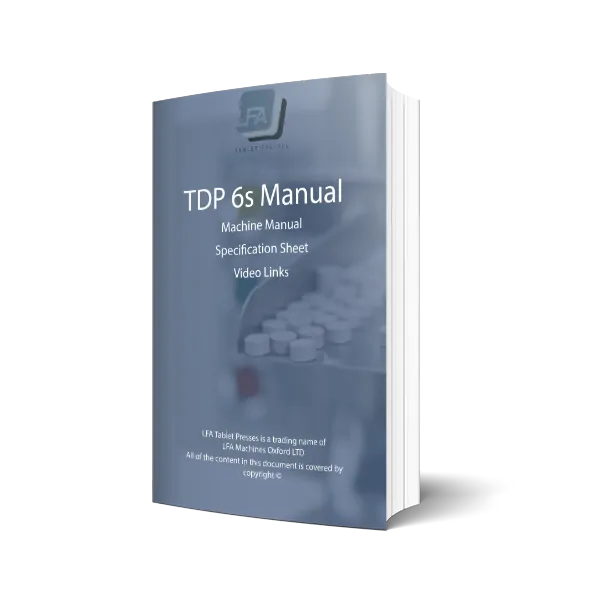
Download the TDP 6s Manual and Specification Sheet for free
This information will help you figure out what the TDP 6s can do for your project.
| Name | Value |
|---|---|
| Product | TDP 6s |
| Number of dies | 1 |
| Max Pressure (kN) | 60 |
| Max Diameter of Tablet | 25mm / 0.98in |
| Max Fill Depth | 18mm / 0.70in |
| Max Thickness of Tablet | 8mm / 0.31in |
| Max Production Capacity Per Hour | 3000 |
| Number of Filling Stations | 1 |
| Double Layered Tablet | No |
| Power USA | 110v, 1 phase, 0.75kW, 60Hz |
| Power UK | 240v, 1 phase, 0.75kW, 50Hz |
| AMP's | 13 |
| Height | 890mm / 35in |
| Width | 500mm / 20in |
| Depth | 880mm / 34.6in |
| Weight | 150kg / 330.7lbs |
| Net Weight | 150kg |
How Much Profit Will This Machine Generate?
Are you able to calculate the amount of profit your business generates per tablet? If so, this calculator will be able to tell you how many hours you will have to run this tablet press to cover its investment.
It will also be able to tell you the amount of profit it will generate every hour you run this tablet press, which makes this calculator a powerful tool when deciding on which tablet press is right for you or your business.
Profit Generated Per Hour
This machine returns it's investment in hours
No. The hopper is currently 304 stainless steel, although we are migrating to plastic. The boot is made from brass, again we are migrating over to plastic boots. The tooling is made from the steel grade that you have selected and can not be made from stainless steel as it is too soft. The ejection tray is made from steel.
Yes. Some of them. There are a number of parts that are able to be changed between the different TDP ranges. This includes the tooling, a lot of the upper and lower drift pin assemblies and the boot bolt and spring.
No, the TDPs are not CE certified. To acquire this certification, they would have to be installed in a protective cage, which we do not provide.
No, sorry the warranty is for parts only. If you need your machine serviced and you do not feel confident to do this, then we would be happy to do so. This is, however, a charge for service. More information on this can be found here: Services | Why Choose LFA Tablet Presses?
Yes, we can come and service your TDP 6s if you would like us to. It is, however, a service that we charge for so you may find that we are not the best people to do it. Here is a link to the costs involved:Services | Why Choose LFA Tablet Presses?
We are also happy to guide you through the service and maintenance of your machine. We do this in two main ways:
The manual, a copy of which can be found here: Product Data
And, with online videos. All of the TDP 6s videos can be found here:Desktop Tablet Press Videos
According to LFA's website, the max tablet diameter of the TDP 6s is 22 mm. Do I just need to order 22 mm tooling for this, or will anything else need to be changed?
Yes, you can, but there are a number of requirements that we need to fulfill first.
You will need to contact our team and provide them with a copy of all of your MSDSs for all of the components of your mix.
We need to have a good understanding of your business and the challenges you are facing.
You will also need to book an appointment with the office that you would like to visit.
For more information please get in contact with the team: https://www.lfatabletpresses.com/contact
Yes. Very easily.
We have free lifetime technical support for all machines sold by LFA.
Just contact us with your machine serial number and we would be happy to help you with any problems.
Yes, the contact surfaces are all food and pharmaceutical safe.
They are made from a combination of, stainless steel, chrome coated brass and the steel used for your tooling (often S7).
As such they are all compliant with most rules for food or pharma manufacturing.
We strongly recommend that you check your local laws as these do vary from state to state and country to country. If in doubt reach out, and we will be happy to find out.
Yes. You can order custom tooling here
Yes. We are able to make multi-tip tooling for the TDP 6s.
However, multi-tip tooling can be expensive. If you are looking to produce high numbers of tablets, then we recommend purchasing an RTP Rotary Tablet Press.
No. It is not possible for a TDP 6s to be modified to have a pre-pressure function. This is because it is a simple up and down motion. If you think that you need a pre-pressure function on your press, then you will need an RTP Rotary Tablet Press. For more information on this, please do reach out to the team.
No, we do not recommend this. The TDP 6s has been specifically developed for the longer dwell time and higher punch pressure. Changing the motor on the TDP 6s for the motor on the TDP 5 will not make it faster but instead only make your machine less effective.
No.
LFA does not recommend leaving any of its machines unattended without an operator ever. Even if they only need to step away for a short amount of time, the operator should turn off the machine.
This will avoid damaging it in the event that there is a jam and the operator is not there to switch it off.
No. The TDP 6s that LFA sells does not come with a variable speed controller.
It is possible to fit one as an aftermarket customization but this is not a service that LFA offers. It is important that this is only done by a qualified electrician.
Yes, the TDP and RTP range all have a weight adjustment for it.
on the TDP it is the bottom of the two cogs on the lower drift pin assembly.
Here is a link to a video showing you how to tune up the TDP 5: https://www.youtube.com/watch?v=4dTscUdRJzQ
Here is a link to a video showing you how to tune up the RTP 9 or the RTP 118: https://www.youtube.com/watch?v=YJFt5AFJ1hw
It is important to know that the exact weight of each tablet will vary from tablet to tablet.
A well-homogenized mix that has a consistent granule size should be able to achieve an accuracy of +/- 3% or less.
It is important to know two things:
Firstly, TDP Universal Tooling came into effect in 2018. Machines brought from LFA before this time may be slightly different sizes. We always recommend checking the size of your tooling before placing your order.
Secondly, a number of companies make unofficial TDP tablet presses.
They do not always conform to the same sizes, tolerance or quality as LFA TDPs or tooling. If you bought your press from someone else other than LFA, we are not able to guarantee that our tooling will fit.
Yes, you do get a die with the machine. Every machine comes fitted with a die.
If you would like you can get this customised with your logo or lettering but it takes 6-8 weeks.
Or, we have a standard 8mm round, bevelled edge with breaker installed in the machines in stock.
That depends on the country you are located in.
In the EU and UK no. You do not need anything to buy the press.
In the USA we have to file a piece of paperwork with the federal government when we sell the press.
We, however, do all of this paperwork for you and do not need to do anything.
The only countries that require a license, as far as we know, are Canada and Australia.
If you are located in Canada then we recommend that you contact Health Canada prior to placing your order. Details regarding the import process can be found at the following link: Importing and registering pill presses (designated devices)
The document you need to fill out and file for a purchase originating in Australia is called a B712. This can be found at: https://www.abf.gov.au/form-listing/forms/b712.pdf. If you would like to speak with one of our team about this, then please get in contact.
Yes, we would recommend installing the entire press inside a cage or perspex box.
Tools are not supplied to use on the TDP 6s press.
No, it does not need to be bolted into position but we do recommend it. If the machine is not secured in position by bolts or another method then it is more likely to shake a bolt loose, resulting in varying tablet weights. On top of this, the vibrations are likely to make the machine sound louder.
The machine does not come with bolts because we do not know the thickness of your surface.
No. The TDP 6s uses what is known as TDP Universal Tooling™ this is a type of single station tooling that is used in all of the TDP range.
Rotary press tooling has a very different construction and can not be used in TDP presses.
Yes. We have a basic manual for the TDP 6s and we are currently working to bring out improved versions. A link to the manual can be found here: Product Data
If you have any feedback on the manual or think that something should be added then we would love to hear from you.
You would have to test it on a machine that is able to give you precise pressure readouts. These are available but are not something that LFA supplies.
The upper drift pin assembly is used to adjust the pressure. You can watch a video on this here: www.youtube.com/watch?v=pc2gfDU3NiQ
Here is another video which tells you how to set up a TDP ready to press: www.youtube.com/watch?v=4dTscUdRJzQ
The pressure on the TDP 6s is adjusted through the thumb screw on the eccentric sheave strap at the top of the machine. If you adjust this in a downwards motion then you will increase the punch pressure, if you adjust it in an upwards direction then you will decrease the pressure.
This is easier than on other TDP presses as you do not need any tools at all to perform this adjustment. It can be done by hand in moments.
A video on how to do this can be found here: How to Adjust the TDP 6s Tablet Press Punch Pressure
There is a bolt eyelet on the top of the machine.
We recommend using an engine hoist to lift the machine off the shipping crate and into the position that you are going to use it in.
Maintenance on the TDP 6s is very short. There are five grease nipples that need grease pumped into them and cogs that need grease applied to them. This can be done in 10-15 mins.
We also recommend cleaning your press at the end of every production run and removing the tooling to store it in oil. This can take about 1 hour but will dramatically extend the life of your machine.
More information on maintenance for your TDP 5 can be found here:
We would recommend cleaning down the machine and leaving it re-greased after every use. This will ensure the longest life possible.
Here is a video on cleaning the TDP 5.
When greasing the machine, avoid getting any grease near the tooling or pressing surfaces, as this will get into your tablets and affect your powders.Grease the top cam well, then apply a small amount to the upper drift pin assembly and the lower timing rod.
More information on greasing your machine can be found here: Product Data
We've created a calculator on our website for most of our tablet presses. See the "profit calculator" tab on the product page and enter your profit per tablet to see how many running hours the press will pay for itself and how much profit per hour it will generate.
This is a common question, and we have tools to help you:
A video on the differences between the different TDP's - www.lfatabletpresses.com/videos/tdp-range
The Right Machine For You Questionnaire - https://www.lfatabletpresses.com/tablet-press-questionnaire
These will explain the different machines, and give you a much better idea. If you are still unsure, please do reach out, let us know what you are making and the quantity, and we will help to guide you through the process.
Yes, we do still support manufacturing tooling for the TDP 6s, however we no longer hold any stock items of the tooling. If you need to order TDP tooling of any dimensions please do reach out to the team and let them know what you are looking for. We would be happy to help.
More information on TDP tooling can be found here: TDP Tooling | Punch & Dies for TDP Pill Presses
No. This machine is only able to make tablets.
It is able to make different size and shape tablets including capsule shape but this is a tablet, not a capsule.
No. If you don’t want to use a binder, then the best thing is to use is a capsule filler since you are just filling the empty capsule shell with your active material.
You should first look at your tableting mix. If you are able to get this right then the powder should bind into a tablet. If you have tried a few mixes and a form of granulation, then the next step would not be another type of tablet press but a capsule filler.
Yes. You have to adjust the pressure whenever you change the tooling. This is for two reasons. Firstly you will have adjusted the setting even just a small amount by taking out the old tooling. Secondly, the new set of tooling will have a slightly different length to the old tooling. This will not be perceptible just from looking at it but a small difference will exist.
When you put in the new tooling the press both of these tiny changes can have a big impact on the tablet that you are making.
Because of this, it is important to make sure that you re-tune the press every time you change the tooling or the mix being put in the press.
Yes, we will cover the warranty but only on the parts that you have not changed or modified. If you are in doubt then please do reach out to the team and check with them first.
There are a number of times when it would be better to get a TDP 5 instead of a TDP6. Really a TDP 6 is only better if you need to make shaped tablets (not-round) very regularly or if you need to make very large tablets (bigger than 12-14mm).
If this is not the case then the TDP 5 is lighter, faster, and costs less than the TDP 6.
No, sorry we do not currently offer bigger hoppers for the TDP range of tablet presses. This is for a number of reasons. Firstly it is important that the TDP 6s is watched during operation. You should not fill the hopper and leave it to run. In the event of a jam, you will need to be able to switch off the machine quickly.
Also, due to the fact that gravity and vibrations are used to move the powders through the machine, they can become subject to what is known as particle separation. The longer the powders are in the hopper the more likely this is to happen. Because of this, we do not advise using a larger hopper than the one fitted to the machine.
No. Sorry the motor on the TDP 6s is set at 3000 per hour. This is so that it has the torque and pressure to achieve 60kN.
Theoretically, yes. All of the pressure of the machine is put through one point where the fill adjustment cog meets the base. This happens during the production of every tablet. You could, in theory, insert a load cell at this point in the press. This, however, is not something that LFA offers or is really able to support.
Yes, the press comes fully assembled in the box. You will need to lift it onto your workbench, and attach the fill tray and the hopper. This can be done using a Phillips or a crosshead screwdriver. It will take a couple of moments to do this.
Please be careful when lifting the press as it weighs 150kg (330lbs). You should use some form of mechanical lift to get it into position, such as a forklift or an engine hoist.
We also have a video on unboxing our TDP 6 here: TDP 6s Unboxing & Setup
In order to determine whether or not your machine is still under warranty, you will need to call or email the office the machine was purchased from, and provide the serial number.
No, we recommend the DTP range as it is fully enclosed. It will also keep your students safer since the encasing will stop the spread of powders around the lab.
Yes, you received the correct machine. At LFA we are constantly working to improve the quality of our machines. We are not able, however, to update the photos and the videos on the website every time we make an improvement.
If you are unsure as to whether or not you got a TDP 6s then the best thing to do is to look on your machine. On your press will be the machine plate which is marked with your serial number along with the make and model of your machine. This will be clearly marked as a TDP6s.
Yes, this could be down to corrosion or due to oxidation of your product. We would highly recommend taking your tooling out of the press and cleaning it at the end of every production run.
We would also recommend polishing the tooling to keep the surfaces clean and less likely to cause picking or capping.
Then the lower punch will come free from the die cavity and it will damage the tooling. Please do not do this.
It is important that you always turn the press over by hand before using the motor. If the press will not eject the tablet then this could be due to the fact that the lower punch has come out of the die bore. If this has happened then you will need to guide it back into place and decrease the fill depth until it is held in place.
Yes, this can happen because the boot bolt and spring have been screwed too far into the press or have not been screwed in far enough. It is important to make sure that the bolt is in the correct position before over tightening the set screw.
It should be pointed out that it will not affect the operation of the press if it is damaged.
The TDP 6s is able to do 2 things that the other TDP presses can not.
It is able to easily make shaped tablets. While the other TDP presses are able to make shaped tablets the TDP 6s does this with the least hassle and highest accuracy.
The TDP 6s is able to apply higher pressure for longer amounts of time. Because it is slowed down, the dwell time is much higher than on the other TDP presses. Combining this with the higher potential pressure output means that the press is able to oftentimes make stronger tablets.
This is a very common question as all of the machines are extremely similar but equally have different strengths.
The easiest way to split these up would be into automatic and manual machines.
The TDP 0 is the manual model and requires you to turn the handle on the side to produce the tablets. This has the least amount of pressure, and is the entry-level model into the TDP range.
The TDP 1.5, TDP 5 and TDP 6s are all automatic machines that are driven by an electric motor. The TDP 1.5 is the entry-level model of the automatic machines. It has the least pressure at 15 kN and it is also limited in the size of the tablets it can produce.
The TDP 5 is our most popular model and can produce approximately 5,000 tablets per hour. The TDP 5 has 50 kN of pressure, and can produce tablets up to 22 mm in diameter.
The TDP 6s is our top-of-the-range machine and is more suited to irregular shaped tablets. The TDP 6s also has slightly more pressure at 60 kN, and is better suited to certain products that do not form tablets as easily.
The length of the warranty on any of the TDP range machines is 1 year from the date of purchase.
This warranty covers spare parts and excludes tooling and maintenance labour from LFA for machine services.
When you receive your machine, you will be given a serial number that will also be stamped onto the press. You will be able to use this if you ever need to make a warranty claim.
Full details on the LFA warranty can be found here: Warranty | We Have You Covered
That will depend on what is known as your powder bulk density of your tablet mix. The easiest way to think of this is in the children's joke: What weighs more a ton of lead or a ton of feathers?
The joke is that they both weigh the same. Only one is much bigger than the other. Tablet presses work in the same way. The press does not weigh out your tablet mix. Instead, it uses the volume of the die cavity to fill and then this is the weight of the tablet.
So if your mix is very dense and granular then you will be able to make a very heavy tablet. If your mix is very light and fluffy then you will not be able to make a very heavy tablet.
The best thing to do is calculate the bulk density of your powder and then use this to work out what size tooling you will need to achieve the target weight for your tablets. A link to the video on how to work out your bulk density can be found here: https://www.lfatabletpresses.com/videos/calculating-bulk-density-making-a-tablet-pill-mix
The maximum diameter of the die is 22 mm regardless of if you are using the motor or operating the machine by hand. This is what LFA recommends. The problem that most customers face is with wanting to use the maximum diameter along with the maximum fill depth and the maximum pressure.
If this is your requirement then it is important to test it before buying the press. Maxing out the press in every respect is difficult and can only be achieved with the perfect mix.
That will depend on what is known as your powder bulk density of your tablet mix. The easiest way to think of this is in the children's joke: What weighs more a ton of lead or a ton of feathers?
The joke is that they both weigh the same. Only one is much bigger than the other. Tablet presses work in the same way. The press does not weigh out your tablet mix. Instead, it uses the volume of the die cavity to fill and then this is the weight of the tablet.
So if your mix is very dense and granular then you will be able to make a very heavy tablet. If your mix is very light and fluffy then you will not be able to make a very heavy tablet.
The best thing to do is calculate the bulk density of your powder and then use this to work out what size tooling you will need to achieve the target weight for your tablets. A link to the video on how to work out your bulk density can be found here:Calculating Bulk Density - Making a Tablet Pill Mix
The TDP 6s can have a yield rate as low as 90%. This will depend on how fine your powders are. If you need to reduce your waste then you should consider an RTP Rotary Tablet Press or granulation.
As with any tablet press, it is good to have a particle size of around 80-60 mesh.
This would be large enough to avoid large losses and small enough to flow well through the machine. If the powder is finer than this then you are going to experience a larger level of loss.
If the particles are larger than this then it might not flow through the machine well and get caught as it is trying to enter into the die bore.
This being said every powder is very different and you will need to do tries to work out what is best for them.
We send out all machines with the local plug on and set up to run on the local power supply.
We would recommend using goggles, a dust mask and gloves at a minimum, but you may require a lot more depending on the products that you are working with, and your local health and safety laws.
Get a capsule filler.
You will not be able to make tablets.
Click here for more information https://www.lfacapsulefillers.com/
There are a number of ways we are able to support you:
- Every machine comes with a full manual that is emailed to you after purchase.
- There is a large range of video tutorials to teach you how to use the press.
- The machine comes with lifetime technical support. You can call, Skype or email to get answers to your questions and problems.
- We also offer free training at any one of our regional offices.
If after all of this you are still struggling to use your press, we are able to come to you. This is a service we charge for.
More information on this can be found here: https://www.lfatabletpresses.com/services
The tension on your TDP 5 belt will depend on whether or not you are installing a new belt or tension on an old one. Here are the exact tensions for the TDP 5:
Installation strand tension for new belt [N] 141.64
Installation strand tension for run-in belt [N] 94.42
To measure the tension on a belt we use a tension pen gauge. Here is a link to a video on how to use the belt tension pen gauge: Browning Tensioning V Belt Drives
Deflection forces for belt tension pen gauge [kg]
New 0.98
Run 0.67
All of our machines are made by us in Taiwan, and are shipped to you from our nearest office.
We have offices in the UK, USA, Germany and Taiwan.
Because they are made by us, we are able to control quality and give you the best support possible. And because they are shipped from your local office, wait times are reduced and customs clearance is avoided, ensuring you have support in your time zone in a language that is convenient to you.
The TDP 5 and the TDP 6s are both able to take shaped tooling. This being said, it is a lot easier to use shaped tooling on the TDP 6s because of the way that the pressure is adjusted.
The most common wear part on the TDP 6s is the boot. This comes in direct contact with the die cavity and can be hit or chipped by the upper and lower punches. This is made of brass so that the tooling is protected in the event of a collision. Because of this, the boot is soft and will wear over time. If anything, we recommend keeping a spare to avoid losing production time.
In addition to the boot, there are four bushings in the TDP 6s that are also made from brass and designed to wear over time. It is likely that you will never have to change these.
We also recommend that you keep at least 1 spare set of tooling as this can break or wear over time.
LFA does aim to hold all major spare parts and tooling in stock so that they are ready to ship out in the event that you need them. The lead times on sold out parts, however, can take up to 6-8 weeks.
The TDP 6s is better for making shaped tablets due to the way the pressure is adjusted. The pressure adjustment happens in a linear motion. This means when you are tuning the press with a shaped set of tooling you do not need to worry about having to re-align the upper punch with the die bore every time you adjust the pressure. This saves not only a lot of time but reduces the risk of damaging your upper punch on the die bore.
If your mix binds really well, then there is no reason. If, however, you need a longer dwell time, higher pressure or to make shaped tablets, then you might find that the TDP 6s is better suited to your needs.
If your main concern is production capacity, then we would recommend the RTP range of tablet presses.
In theory yes, but in practice, not necessarily.
The TDP 6s has 60kN of pressure which is the highest amount of any of the TDP presses. This and the fact that it runs slower is increasing what is known as dwell time. This means that your powders are under compression longer which increases the hardness of your tablets. So, if you put the same mix in a TDP 5 and a TDP 6s, in theory, the TDP 6s should produce a stronger tablet.
This being said, the press used to make a tablet is not the only thing that has a bearing on how hard the tablet eventually comes out. So if you mix is very directly compressible then using a TDP 6s instead of a TDP 5 will make it no stronger or harder.
Similarly, if your powder has no binding properties at all then it will not matter how much pressure you apply. You might never be able to make a hard tablet.
There are three reasons to granulate your formula:
1. To improve the flowability of your formulation.
2. To make your formulation more compressible.
3. To ensure a consistent spread of API throughout the formulation.
If you would like to find out if your mix needs granulation then we do have a tablet formulation service available.
You can find out more about the tablet formulation service here: https://www.lfatabletpresses.com/services


